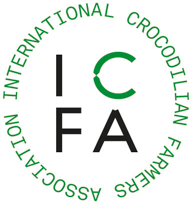Good operating practices
- Crocodilian farming practices have evolved in different countries, using combinations of traditional knowledge and innovative, science-based approaches. The type of farming system employed is usually determined by the species being farmed and climate of the particular geographical region.
- ICFA has developed a series of guidelines called the ‘Good Operating Practices’ (GOPs); covering animal welfare, environmental and social issues. These are designed to provide farmers with the latest scientific understanding of crocodilian farming and enable them to employ good husbandry procedures.
- The overall objective of the GOPs is to help farmers continuously improve product quality, achieve animal welfare outcomes, maintain biosecurity, reduce the impact on the environment and manage risk. The GOPs also serve as a guide for new farmers that enter the industry.
- A manual of the 40 good operating practices, relating to procedures from hatching to processing, is available for use by all ICFA members.
Fields of standards
The ICFA Standard
- ICFA used their ‘Good Operating Practices’ as a basis for the development of a formal standard containing mandatory requirements for crocodilian farming – ICFA Standard 1001:2019
- The requirements contained in the Standard cover:
- Crocodilian health, welfare and biosecurity;
- Responsible use of veterinarian medicines;
- Traceability and product integrity;
- Organizational management and personnel competence; and
- Biodiversity, environmental and emergency management.
- The Standard is outcome-based; allowing crocodilian farms around the world flexibility on how to demonstrate that the outcomes required by the Standard, are being achieved.
- Referenced in the Standard are all relevant regulatory obligations based on International Conventions, specifically the CITES (the Convention on International Trade in Endangered Species). The fulfilment of the ICFA Standard and Certification Scheme requirements, demonstrates that farming operations are legal, sustainable and achieve animal welfare outcomes.
- The Standard is a living document based on existing scientific knowledge of crocodilian welfare and farming practices. There are formal Standard development procedures in place that allow it to be revised it based on good practice and new scientific understanding.
Standard development process
- ICFA have implemented a multi-stakeholder standards development process that reflects the following international expectations:
- World Trade Organization (WTO) Agreement on Technical Barriers to Trade, Annex 3 Code of Good Practice for the Preparation, Adoption and Application of Standards;
- ISO/IEC Guide 59:1994, Code of good practice for standardisation;
- ISO/IEC 17007:2009, Conformity assessment – Guidance for drafting normative documents suitable for use for conformity assessment; and
- ISEAL Code of Good Practice Setting Social and Environmental Standards, Version 6.0, December 2014.
- The ICFA Standards Development Committee comprises of farmers, veterinarians, standards and certification specialists, regulators, and scientists with expertise in crocodilian production, animal welfare, and conservation.
Research and progress
- Objective scientific research remains the most reliable and definitive mechanism for resolving potential welfare problems and for uncovering new insights into improved husbandry practices.
- ICFA understands that continuous improvements in animal welfare involves a commitment to on-going research and collaboration.
- The association will continue to encourage, support and undertake research aimed at improving animal welfare in the context of farming practice, and developing objective mechanisms to demonstrate that good animal welfare is achieved.
